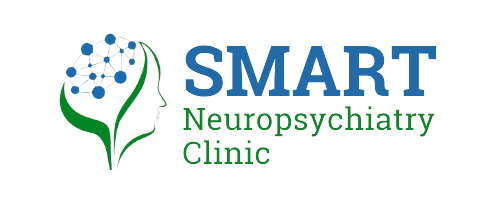Repetitive Transcranial Magnetic Stimulation (rTMS)
Repetitive Transcranial Magnetic Stimulation (rTMS) is a non-invasive brain stimulation technique used to treat various mental health conditions. During an rTMS session, electromagnetic coils are placed near the scalp, targeting specific areas of the brain associated with mood regulation and other functions. These coils produce magnetic pulses, which stimulate nerve cells in the brain.
Common Benefits of rTMS
rTMS effectively treats conditions such as depression, anxiety, and certain neurological disorders.

Non-Invasive
rTMS does not require surgery or anesthesia.

Minimal Side Effects
Most patients experience only mild scalp discomfort or headaches.
Ideal for individuals not responding well to medication or preferring non-pharmacological options.

Customizable Treatment
The intensity and frequency of rTMS sessions can be adjusted to suit individual needs.
Here are some common FAQs about rTMS
How does rTMS work?
rTMS stimulates nerve cells in brain areas related to mood regulation. This helps alleviate symptoms of various mental health conditions.
Is rTMS safe?
Yes, rTMS is safe, non-invasive, and doesn’t require anesthesia or surgery. Any risks or side effects will be discussed beforehand.
How long does a typical rTMS session last?
A typical rTMS session lasts between 20 to 40 minutes, depending on the protocol used.
How soon can I expect to see results from rTMS?
Some patients see improvement within weeks, while others take longer. Completing the full treatment course is crucial for maximum benefit.
Are there any side effects of rTMS?
Common side effects include mild scalp discomfort or headaches. Rarely, it may cause seizures in individuals with pre-existing risk factors.
Who is a good candidate for rTMS?
rTMS suits individuals not responding to medication or psychotherapy, or those preferring non-pharmacological treatments. A thorough evaluation will determine suitability.
How do I prepare for an rTMS session?
Your healthcare provider will give specific instructions on how to prepare for your first session.
Is rTMS covered by insurance?
Coverage varies by insurance provider and plan. Check with your provider to determine your coverage options for rTMS.
Are there any long-term effects of rTMS?
rTMS is generally safe, with many patients reporting sustained improvement in symptoms after completing the full treatment course.
Can I drive myself to and from rTMS sessions?
Yes, it’s typically safe. If you experience dizziness or lightheadedness, wait until you feel fully alert before driving.
Need help for someone you care about?
We know how hard it is to watch someone you care about struggling. Finding the right care is the first step. If you want guidance on the best mental health support for yourself or a loved one an Smart Clinic Consultant can help you.



